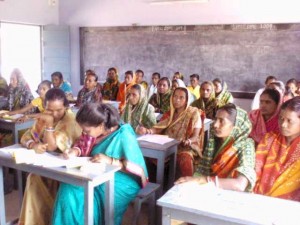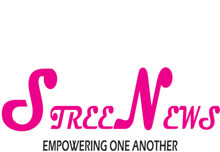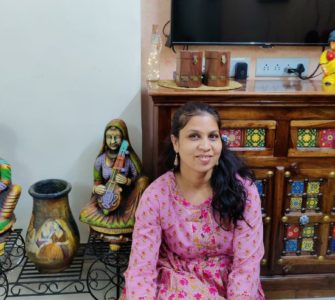 Education is important for everyone but when it comes to a woman its importance becomes even more prominent. The notion that education leads to women’s empowerment has gained popularity, although we still have much to learn about how education actually empowers women. At the core of the word empowerment is ‘‘power.’’ Women’s empowerment is a process through which women come to recognize their inherent worth, their ‘‘power within’’ and begin to participate on equal terms with men in efforts to dismantle patriarchy and promote social and economic development.
Education is important for everyone but when it comes to a woman its importance becomes even more prominent. The notion that education leads to women’s empowerment has gained popularity, although we still have much to learn about how education actually empowers women. At the core of the word empowerment is ‘‘power.’’ Women’s empowerment is a process through which women come to recognize their inherent worth, their ‘‘power within’’ and begin to participate on equal terms with men in efforts to dismantle patriarchy and promote social and economic development.
For women to become empowered in their intimate relationships, they must develop the ability to negotiate and influence the nature of the relationship and the decisions made within it. Negotiating new roles in the household is important because around the world women spend more time on housework and child-rearing than their male counterparts do. While women’s public roles have changed dramatically in recent decades, evidence suggests that there have been fewer changes in gender relations within the private sphere. Women’s empowerment means the loss of men’s traditional power and control over the women in their households: control of her body and her physical mobility; the right to abdicate from all responsibility for housework and the care of children; the right to physically abuse or violate her; the right to abandon her or take other wives; the right to take unilateral decisions which affect the whole family; and the countless other ways in which men and indeed men of every class have unjustly confined women. For this purpose education needs to broaden the discussion of gender consciousness.
Women and importance of education
Education is the key for women to move up the ladder of society. The idea that women are inferior to men has been embedded in our culture, even though there are people out there that believe women are as smart and strong enough to handle all the things that men do, but this number is just not enough. Many women have done their best to be equal to any men out there, and the main element that enables them to slowly change the bias view of the world is through education. A woman with knowledge is a respectable woman; she has the power to make people listen to her and the charisma that makes people follow her.
There is no valid argument by which the exclusion of the female sex from the privilege of education can be defended. It is argued that women have their domestic duties to perform and that, if they were educated, they would bury themselves in their books and have little time for attending to the management of their households. Of course, it is possible for women as it is for men to neglect work in order to spare more time for reading sensational novels.
But women are no more liable to this temptation than men and most women would be able to do their household work the entire better for being able to refresh their minds in the intervals of leisure with a little reading. Education would even help them in the performance of the narrowest sphere of womanly duty. Women ought to be something more than a household drudge. She ought to be able not merely to nurse her husband in sickness but also to be his companion in health. For this part of her wifely duty, education is necessary, for there cannot be congenial companionship between an educated husband and an uneducated wife who can converse with her husband on no higher subject than cookery and servant’s wages. Thus, an educated Indian woman will yield a positive impact in the Indian society by contributing positively to the economy of both the country and the society.
In Asia, India has the lowest rates of female literacy. This is attributed to the fact the country has a biased outlook towards the education of women. The Indian society feels that a woman is a liability who will one time get married and will not contribute the economic and social development of the family. The society perceives a woman as somebody who cannot do other duties apart from her traditional duties of cooking and housekeeping. As a result, the society considers home training more important as compared to formal education.
Another contributing factor is the rapid growth of the population. Most Indian households have a number of children whose needs are much higher than their earning capacity. This leads to the neglect of the girl education and put more emphasis on the education of the boy child. In this instance, marriage is taken more seriously as opposed to education hence a number of Indian girls are married at a younger age. This becomes as an impediment in the education of the Indian woman.
Concept of Intimate relationship
The phrase ‘intimate relationship’ is a broad and fluid term, in that it can encompass numerous different associations between friends, sexual partners, family and kin. Genuine intimacy in human relationships requires dialogue, transparency, vulnerability and reciprocity. The verb “intimate” means “to state or make known”.
Intimate is a term that aptly describes an emotionally nourishing relationship. It follows that if our relationships are intimate and ever-deepening, we’ll be balanced and growing, and the quality of our lives will be fulfilling and meaningful.
The language of intimacy makes for an emotionally nourishing exchange between two people characterized by deep caring and understanding. It is how and what people communicate to each other, both verbally and nonverbally, and continues to deepen over time. Intimacy and intimate communication can be summed up as the ability to achieve a mutual understanding, being in tune with each other. Understanding is abundantly nourishing. When there is understanding, both people are receiving and providing nourishment and their relationship becomes a source of sustenance.
Intimate relationships have four basic ingredients: respect, trust, acceptance and knowing (each other), which can take place through both verbal and nonverbal communication. Perhaps the most important implication is that these four basic ingredients also apply to the relationship one has with oneself. How can one respect, trust, accept and know another person when one doesn’t feel that way about oneself – when one doesn’t have self-respect, trust of self, self-acceptance and self-knowledge? It can only happen when one is in touch with and able to identify what one is feeling, wanting or needing. The recognition that a line has been crossed (i.e., that one is disrespected, not safe to be open, honest and vulnerable; that one is being held to unrealistic expectations, or is not being accurately seen or heard) comes from an inner knowledge. To sustain intimacy for any length of time requires well-developed emotional and interpersonal awareness.
Empowerment of women in intimate relationships
Women empowerment is, in fact, a multidimensional phenomenon consisting of access to decision making in all the family matters, political matters, and social factors. A priori, one would expect a woman’s major socio, economic or political decisions to be significantly influenced by whether or not her level of education, income capacity, social awareness etc. On the other hand, a woman, without having any freedom to express her willingness, may not be able to assert her right to enjoy the social and economic benefits inspite of having all provisions for them.
Women’s empowerment has five components: women’s sense of self-worth; their right to have and to determine choices; their right to have access to opportunities and resources; their right to have the power to control their own lives, both within and outside the home; and their ability to influence the direction of social change to create a more just social and economic order, nationally and internationally. Combining all these ‘women empowerment’ may be defined as a package of both the financial and decision-making power.
Conclusion: Relational resources are a key factor in women’s empowerment in intimate relationship. Interpersonal skills must be combined with women’s gender consciousness and their access to material and or structural resources to have full effect. Education therefore has the potential to empower women in their intimate relationships if it improves their gender consciousness, relational resources, and material resources. Strengthening relational resources (e.g. communication skills, the ability to express feelings and demonstrating care and love) is often overshadowed by goals associated with educational access. However, for education to be genuinely empowering, it must facilitate the transformation of unjust relationships and values. Access to education is often seen as a process by which individuals will gain the skills that will enable them to more successfully participate in the labour force, thereby contributing to a process of poverty alleviation. However, access to material resources (e.g. education and employment) has done little to change women’s status when they come home.
Women’s empowerment demands that both women and men change. Women’s empowerment is not an end in and of itself, but rather a step towards the establishment of gender equality. This implies that men will have to give up their traditional power and control over women. As quoted by Srilatha Batliwala, a scholar/activist that the process of women’s empowerment will also liberate men, as they will be able to move beyond gender stereotypes. While some men may fervently resist giving up their control over women others may be more willing and there are several reasons why men may embrace the call for gender equality. Among these are men’s ‘‘relational interests’’ in gender equality, because the quality of every man’s life depends to a large extent on the quality of his relationships.
 By: Miss Savina R. Crasto
By: Miss Savina R. Crasto
Advocate, High Court
Partner of M/s Right & Rights
Visiting Faculty at Siddharth College of Law, Mumbai
Email: savicrasto@gmail.com













